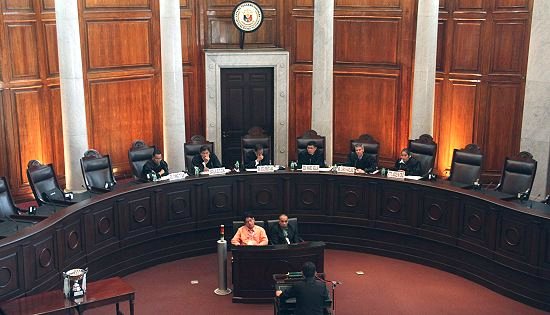|

A
mooter argues his case during the final round of the 2012
National Moot Court Competition, the only moot court competition
being held at the Supreme Court's en banc session hall. (ICRC /
S. Velasco) |
University of St.
La Salle regains moot court cup in 2012 finals
By ICRC
September 7, 2012
MANILA –
It was worth the wait for University of St. La Salle to regain the
championship cup in the 2012 National Moot Court Competition on
International Humanitarian Law.
USLS-Bacolod faced Ateneo de
Manila Law School in the finals held today at the Supreme Court en
banc session hall but they were hailed the winner of the annual
competition that aims to promote knowledge and appreciation of
international humanitarian law (IHL) among Philippine law students.
USLS and Ateneo argued over the fictional case of Colonel Jones who
was facing charges in the International Criminal Court for alleged
violations of IHL, also known as the law of armed conflict.
"All the efforts that we put
into the preparation became worth it when we finally got here, because
the last time our school team won was five years ago. In the
succeeding years, we worked hard but we didn't make it. Finally, this
year we reached the (finals at the) Supreme Court and won the cup,"
said Nadine Abenoja of USLS, who won best mooter for the final round.
As the winning team, the
USLS students will represent the Philippines in the Asia-Pacific
regional finals in Hong Kong in 2013.
Competition was extremely
fierce during the final round, which was judged by an esteemed panel
composed of Supreme Court Associate Justice Roberto Abad, Dr. Mario
Aguja of Mindanao State University-General Santos City, Philippine
Judicial Academy Chancellor Adolfo Azcuna, Brigadier General Domingo
Tutaan Jr., chief of the Armed Forces of the Philippines-Human Rights
Office, ICRC Regional Legal Advisor for Southeast Asia Christopher
Harland, and De La Salle University School of Law Vice Dean Jocelyn
Cruz.
"It's been a very positive
competition. I think it's pretty clear that mooting, in general, suits
universities in the Philippines very well," said Harland, a veteran
judge of moot court competitions. “The presence of IHL in curricula,
the discussion of this law in the media, and the commemoration of IHL
month annually in August itself, show that this competition finds a
very good home in the Philippines.”
The runner-up team from
Ateneo Law School did not go emptyhanded, winning both awards for best
memorials, which contain prepared written arguments from the
perspective of the prosecution and of the defense.
Pauline Gairanod from the
University of the Philippines College of Law school team won the
Justice Ines Luciano Best Mooter Award as the highest-ranking oralist
in the elimination rounds. This award, given for the first time, pays
tribute to the Court of Appeals associate justice and chairperson of
the IHL Committee of the Philippine Red Cross who passed away last
year. The UP team also won the role-play challenge, during which teams
acted in roles in a simulation aimed at showcasing practical
applications of the body of law that seeks to limit, for humanitarian
reasons, the effects of war.
Students from 10 law schools
took part in this year's event organized by the International
Committee of the Red Cross (ICRC), the Philippine Red Cross (PRC), and
the Supreme Court of the Philippines. This year's competition was
hosted by De La Salle University Manila.
Other participants came from
Far Eastern University-Manila, San Beda College of Law-Manila,
Southwestern University, Saint Louis University, University of
Batangas, University of the Cordilleras, and Cor Jesu College Law
School.
The moot court contest began
in 2005 with only six participating schools but it is now considered a
prestigious event for law students, being the only moot court
competition that holds its finals in the en banc session hall of the
Supreme Court. This year’s competition was hosted by De La Salle
University in Manila.